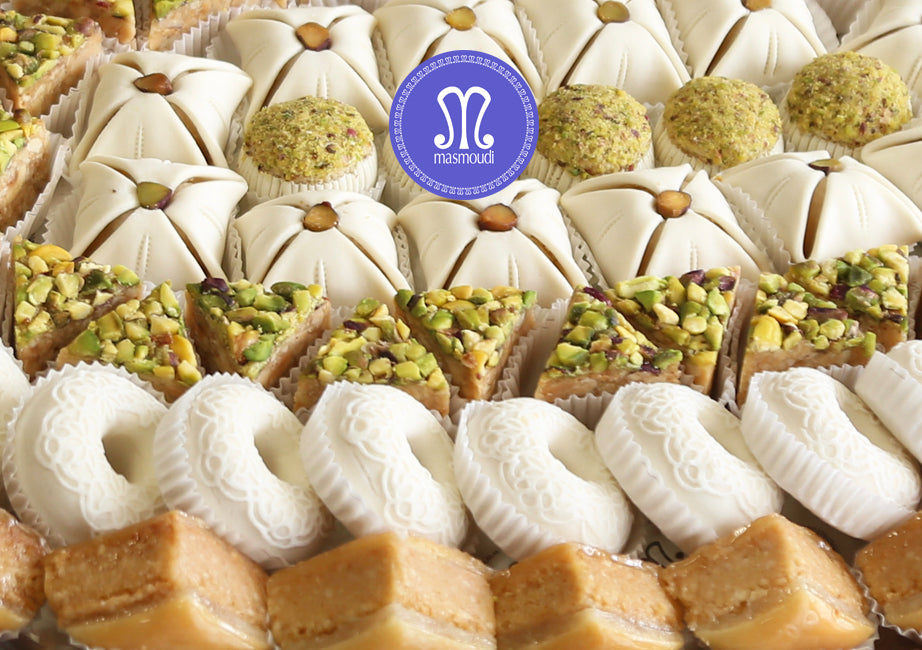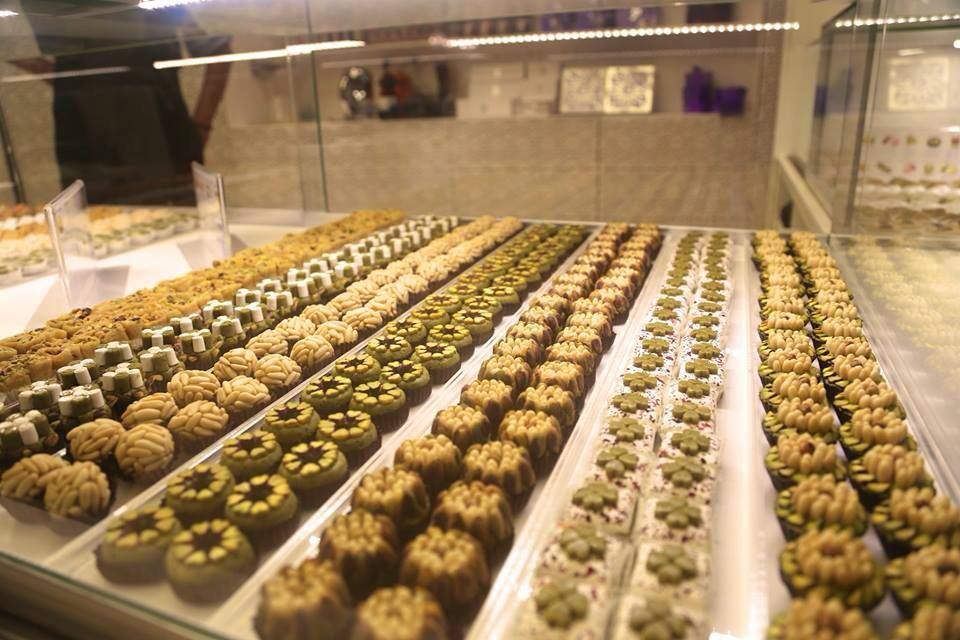It's a wonderful story where founding myths, family secrets, arts and traditions and great determination are mixed in the aromas and flavors. It is the story of Moufida Aloulou Masmoudi, (1933-2018), best known for her pastry brand "Madame Masmoudi", who set out to conquer Europe. Fate will make her the heiress of a great tradition, fueled by a strong imaginary Orient and subtle know-how. Willpower and hard work will eventually make her a success. Like other colleagues, she gave to the Tunisian pastry a new set of refinement and creativity, using in addition the innovations of the packaging design and the marketing levers.
A pastry chef at the Palace or a brilliant success story
Who does not know today, in Tunisia and even in Europe, the Masmoudi Pastries, this wide and fabulous range of cakes inspired by the pure Sfaxian tradition and which smell the perfumes of their soil!
What is less known is the moving story of a family gathered around the mother who has managed, over the years, to forge a reputation without defect, in a sensitive domain. It is the saga of a modest but exceptional woman, with an innate temperament of a tireless fighter; one would say today an activist. For almost half a century of hard work, she has been able to combine tradition and modernity, evolving from a handicraft of a strictly family character to an activity that certainly preserves the hand-made work, but that solicits industrial techniques to rationalize and improve the production. Proud of her fifteen springs, on the occasion of a memorable trip to Tunis in the late forties of the last century, she saw the night of destiny open to her (laylat al-qadr).
During an unexpected visit to a distant relative, better known by the name Mimi, who owned a pastry shop in the heart of the city, on the current avenue Bourguiba, which was very popular with the trendy people of the capital, she had a revelation: pastry would be her vocation. Emna Chérif, a Sfaxienne settled in Tunis since a certain date, had perfected her know-how by watching an experienced pastry chef called Khadija Kahouagi. Moufida still remembers this initiatory visit during which she received this illumination and made this fascinating discovery that allowed her to learn the trade, to penetrate its secrets and pierce its mysteries.
One day, she accompanied Mimi to the beylical palace of La Marsa; Mimi was the official supplier of the palace. There, on the occasion of the marriage of Prince Slahedine, she had the honor of greeting His Highness Moncef Bey, this patriotic monarch if there is. These are indelible memories, engraved in the abyss of memory. She returned to the palace that celebrated the birth of Azza, the eldest child of the prince. On her third visit, she was disenchanted by the excessive pomp of the last of the beys, Mohammed Lamine.
Over time, Moufida mastered the art of pastry-making to the point that she aroused the jealousy of relatives and friends and even women who were experienced in the trade. Today, she still remembers the premonitory vision she had, seeing herself in a small Renault driven by a man named Abderrazak, and who directed her to what will be Sfax Al-Jadida (the new Sfax), at the location where the building will be built that will house its most important workshop. Abderrazak is a first name that derives from the Arabic noun rizq, meaning sustenance, good, but which connotes a divine gift. Back to her native city, she got married at the age of 22, it was in 1957 and, by way of occupation, she started knitting as many women did at that time. But soon she got tired of this monotonous task and decided to take up baking again and to venture into this still unknown field for her, in such an industrious city, where women do not skimp on work. But deep down, it was as much to answer the call of her vocation as to provide a supplementary income for her small family.
A first order that paves the way
Previously, and as coincidence would have it, as they say, she prepared one day some baklava and marzipan for her own consumption. Unexpectedly, a visiting relative tasted them and was won over; she ordered a quantity to give as a gift on her next trip to Libya. Apparently, this was her first customer; since then, her order book has not been empty; it was in the year of grace 1972.
Until the end of the 60's of the last century, the confection of traditional pastries in Tunisia, and in Sfax in particular, was a family exclusivity. But the reputation of the superior and exemplary quality of Moufida's confections grew and soon upset these culinary traditions. Very soon, the neighbors, the neighborhood and then the whole city, seduced by the authenticity and creativity of her production, entrusted her with the preparation of their pastries for all kinds of happy events, despite the sometimes unhealthy competition. Thus, this woman was one of the main initiators of the pastry trade in Sfax. To Mimi who often came to Sfax, she provided without stop, for his Tunisian customers, the delicious marzipan became his first specialty, it was a real success. At this point, it should be noted that the recipe of mlabbès is a very advanced accumulated know-how and reveals a deep knowledge of ingredients and aromas, even those from elsewhere. The glazing of the cookies is a delicate operation that requires the preparation of a meringue (beaten egg white) associated with two gelling agents: gum arabic (smagh gharbi), provided by the Arabian acacia and gum tragacanth (kthira) which exudes from the stems of the astragalus, a herbaceous plant that grows in the Middle East. These two substances, which allow the glaze to harden quickly, are first marinated overnight in rose water with a touch of blue dye to give the mlabbes such a bright, immaculate white color.
From artisanal to modern workshop
For Moufida, better known from now on by her elegant name Mrs. Masmoudi, the business was booming. She was often forced to stay up late at night to satisfy her growing clientele; she even solicited the help of her children as soon as they came home from school, to shell and grind the almonds, or to supervise the cooking. Her husband, a chef, was also called upon when he returned from work. It was breathtaking, but it was the start of an activity that would, over the years, experience an ascending curve. From the domestic craft work, the Masmoudi Pastries pass in workshop with the acquisition of modern equipment of grinding and kneading. As her activity progressed, Moufida showed a gift of creativity constantly renewed and, from the traditional forms, she succeeded in realizing, in addition to the baklavas, the gimblettes and the marzipans, new creations: aïn sbanyouriya, aïn ghezal, dawama...
Mrs. Moufida Masmoudi remains passionate about the particularities of her land and its pastry traditions. This natural inclination to the art of fine pastry, nurtured by an apprenticeship at a good school, has allowed him to master the recipes and ancestral processes, until excelling and making its own contribution to the influence of this discipline of gastronomy. The tradition works by accumulation.
A meticulous selection of ingredients
The meticulous selection of raw materials is essential to the superior quality of Masmoudi's creations. All the plantations in the region and even in the Mediterranean basin are constantly explored to ensure the supply of pistachios, almonds, pine nuts... from the best soils. The scrupulous work of these raw materials, by hand, is similar to the work of a goldsmith making jewelry from stones and precious metals. The constant search for refined flavors, the careful work of aesthetics and shapes, combined with these noble materials, create the harmony essential to the birth of these beneficial pleasures.
Already at the Guinness-book with a giant baklava
Having succeeded in imparting the passion of pastry-making to her already mature children, Mrs. Moufida Masmoudi decided in 1992 to found a family business bearing her label and designed according to modern management standards. Practically, she entrusted her children with the heavy task of taking over from her and continuing the work, and instructed them to work in harmony and mutual respect. Thus, it was done, so that the Masmoudi Pastries, which have today a rich palette of flavors, shapes and textures, enjoy a reputation far from being usurped, including several points of sale scattered throughout the country and in France.
These assets, associated with a constant effort of rigor, a keen sense of quality and an innovative spirit, have allowed to gather the conditions of an economic success, and at the same time, to enhance the national pastry heritage. Beyond this constant propensity for professionalism at all levels of the production process, and beyond the passion required by the profession of pastry chef, the challenge is to conquer the international market. Ali Baklouti, journalist imbued with "sweet sfaxity", says so well and not without admiration: "The Masmoudi Pastries celebrate in 2012 the fortieth anniversary of their existence. Ten years earlier, on their thirtieth anniversary, they succeeded in registering in the Guinness-book, by making a giant baklava. The celebration of the fortieth anniversary represents an exceptional event that will crown a long journey made of generous and sustained efforts, successes and sorrows, and will consecrate a business model based on the spirit of continuity and the durability of the family label, but also on the quality option that remains an unavoidable constant in the company's approach".



